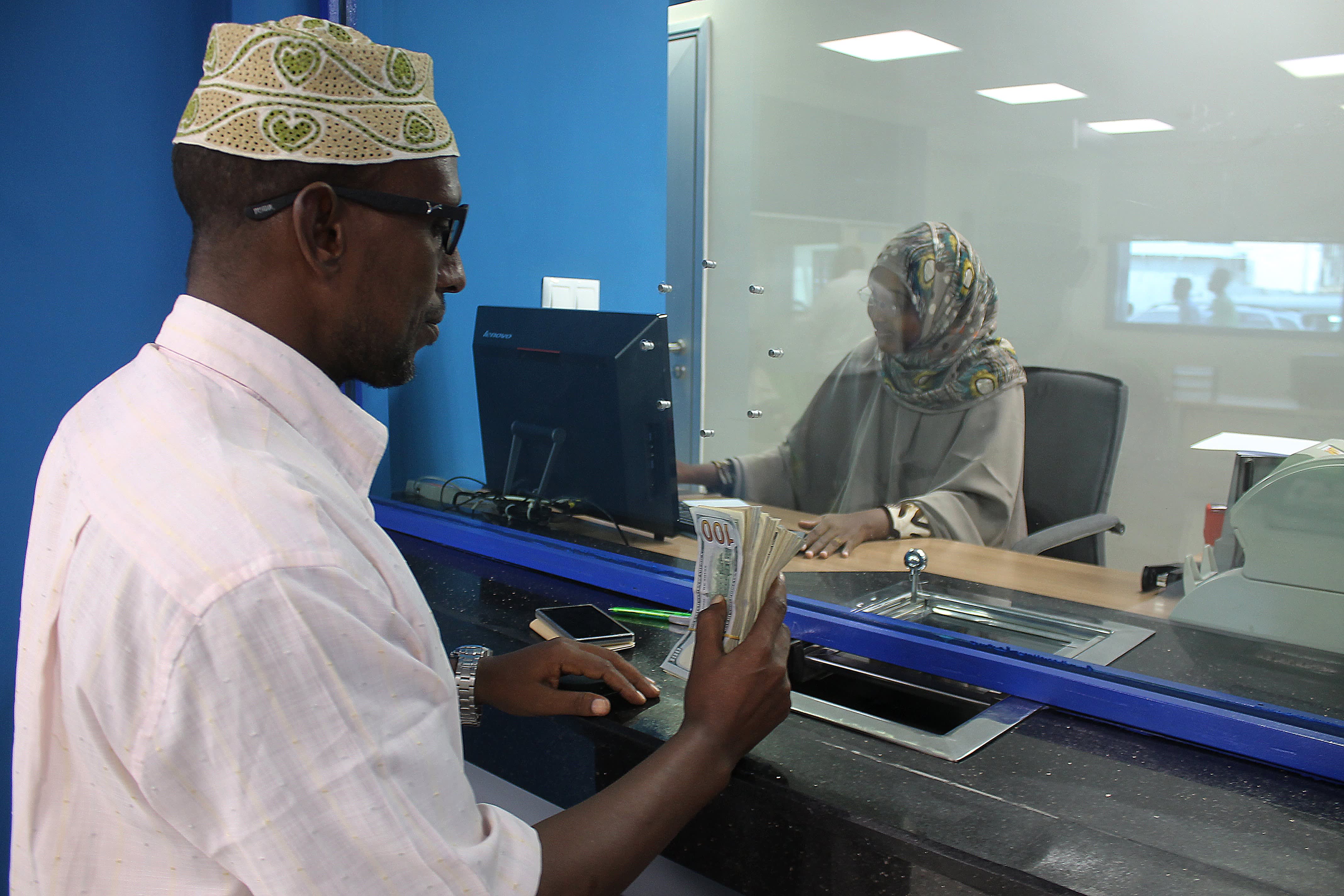A customer at a bank in Mogadishu, Somalia on June 7, 2015.
Abdulfitah Hashi Nor | AFP | Getty Images
The coronavirus pandemic is leaving migrant workers unable to send money or goods home to families, cutting off a vital lifeline for communities already under siege from a barrage of external shocks.
Remittance flows to low and middle-income countries (LMICs) are projected to fall by almost 20% in 2020, one of the sharpest declines in history, according to the World Bank.
The coronavirus pandemic has led to mass unemployment and hammered wages in the U.S. and Europe, key destinations for migrant workers, leaving many unable to send money home.
A number of major European countries have introduced furlough schemes to partially subsidize wages for those unable to work, but many of those in less formal employment have still found themselves without income. For workers in the U.S., there is less of a social safety net, which has led to more than 40 million Americans filing for unemployment since the pandemic was declared in mid-March.
Sub-Saharan Africa is projected by the World Bank to suffer a 23.1% decline in remittances over the course of 2020. To compound the tighter financial conditions for African migrant workers, in the first quarter of 2020, the region continued to have the highest average remittance costs, with the average transfer of $200 charged at about 9%.
Residents transfer money using the M-Pesa banking service at a store in Nairobi, Kenya, on Sunday, April 14, 2013.
Trevor Snapp | Bloomberg | Getty Images
Even for those who have maintained the financial capability to transfer money, lockdown measures have impacted access to MTOs (money transfer operators) in receiving countries.
Oxfam and around 90 other NGOs, academics and aid workers recently penned a letter to international bodies documenting the impact of the plunge in remittance payments in Somalia, in particular.
The letter urges the U.S. and European governments to take urgent action to facilitate wiring or other payment settlement mechanisms, and calls on Somali officials, MTOs, international banks and bodies such as the UN to coordinate efforts to boost the accessibility of remittance payments.
Somalia: A case study
Many domestic economies in Sub-Saharan Africa are suffering as a result of shutdowns associated with the coronavirus pandemic, and in some cases dealing with multiple concurrent shocks such as historic locust swarms, droughts, flash flooding or violent insurgencies.
Almost half of all households in Somalia rely on remittances to cover basic needs such as food, water, health care and education. The UN estimates that 4.1 million Somalis are food insecure in 2020, while around 2.6 million are internally displaced and more than a third have insufficient water for their basic day-to-day needs. The country’s total population is just over 15 million, according to World Bank data from 2018.
The above average rainy season anticipated in the coming months is expected to exacerbate the flash flooding which has devastated communities, along with offering ideal breeding conditions for the locust swarms that have affected around 360,000 hectares of land.
Meanwhile, conflict continues to rage between government forces, clan actors and insurgent groups, including notorious terror organization Al Shabaab.
People gather near burnt vehicles a day after a truck bomb exploded in the center of Mogadishu on October 15, 2017.
Mohamed Abdiwahab | AFP | Getty Images
Some MTOs in Somalia have had their bank accounts closed due to bank concerns about exposure to terrorism financing and anti-money laundering regulation, preventing access to their online services, according to the letter. Others have been rendered unable to reach more remote locations of the country, including settlements for internally displaced persons and refugees, the most vulnerable portion of the population.
“MTOs not only provide the only viable mechanism to legally and transparently send money to Somalia/Somaliland, they also serve a dual function in terms of providing letters of credit to Somali traders who come to Dubai, Djibouti and other international hubs to purchase essential food and nonfood items for sale inside Somalia/Somaliland,” the letter explained.
“Across the U.S. and around the globe, Somalis are working hard to support their families back home,” Scott Paul, Oxfam America’s humanitarian policy lead, said in a recent statement.
“Sadly, many have fewer resources to share today, and because of the U.S. government’s irresponsible approach to bank regulation, banks have been scared away from helping Somalis send what they can.”
A displaced Somali woman sits outside her temporary dwelling after fleeing famine
Feisal Omar | Reuters
Paul called on the Treasury Department in the U.S. and governments elsewhere to take urgent action to enable Somali families to cover their “rent, food, medicine and school fees as Covid-19 spreads.”
As of Friday morning, Somalia has 1,828 confirmed cases of Covid-19 with 72 deaths.
Oxfam’s country director in Somalia, Amjad Ali, said the pandemic is “laying bare and exacerbating inequalities” and highlighting that “too many among us are living on the brink.”
“We now need to see leaders step up to support vulnerable communities with the social protection they need and deserve, while also easing the way for families to support each other through hard work and remittance payments.”
